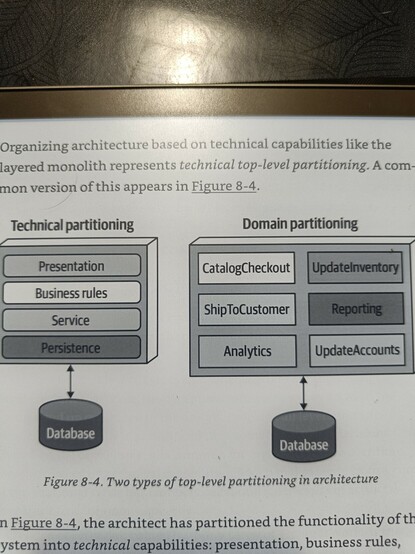Bastian Waidelich · @bastian
18 followers · 7 posts · Server neos.socialhttps://www.youtube.com/watch?v=IgigmuHHchI "The Aggregate is dead" talk by Sara Pellegrini and Milan Savic
And my #PHP implementation of their example: https://neos.social/@bastian/110496791035896667
Patrick Drechsler · @drechsler
62 followers · 62 posts · Server floss.socialDiesen Freitagabend um 20:30 Uhr bin ich bei Gregor Biswangers "Coding Zone" eingeladen, und spreche über Fehlerbehandlung #dotnet #ddd #functionalprogramming
Jeder ist eingeladen!
https://www.meetup.com/de-DE/my-coding-zone/events/294107025/
#dotNET #DDD #functionalprogramming
Bastian Waidelich · @bastian
18 followers · 5 posts · Server neos.socialI tried to implement the #DynamicConsistencyBoundary example described by Sara Pellegrini with #PHP and it is quite promising:
https://github.com/bwaidelich/dcb-example
#DDD #EventSourcing #DCB
#dynamicconsistencyboundary #php #DDD #EventSourcing #dcb
Pablo · @pacumo
60 followers · 491 posts · Server hostux.social#ddd folks, I come to you again with an ignorant question needing an answer.
In the latest book I am reading (Fundamentals of Software Architecture) it is said that having a layered architecture is antithetical to domain driven design (and it cites the blue book).
But I seem to remember that in the blue book it is heavily implied (or even said outright) that DDD only relates to the 'business rules' layer?
What obvious thing am I missing? 😳😅
Pablo · @pacumo
59 followers · 489 posts · Server hostux.socialI'm planning to over-engineer a simple game to learn about architecture and design.
In this article I explain the game mechanics and potential future features, as well as the chosen layered architecture with MVC pattern and persistence layer. Lastly, I share the lessons learned from intentionally over-engineering a project.
https://blog.codemanship.dev/part-1-basic-architecture?showSharer=true
#gamedev #DDD #architecture #gamedesign
Pablo · @pacumo
54 followers · 420 posts · Server hostux.socialPablo · @pacumo
46 followers · 306 posts · Server hostux.socialI guess this is progress, while reading the #ddd book I came across the explanation of Entities and Value Objects.
First thought when reading about Value Objects;
But if my address is in my db it actually does need an id or some sort of primary key.
But then I remembered my domain layer actually does not care about how the db is implemented. *Progress!*
Also, TIL about why immutability is important in Value Objects but might be counter productive in Entities .
Pablo · @pacumo
37 followers · 190 posts · Server hostux.socialWhat best practices do you believe are sine qua non?
Of those which are espoused at your work place?
Which do you espouse on your hobby projects?
Me:
1. #tdd, #refactoring, #cleancode, #solid(ish), #agile
2. #agile(ish), #ddd (starting), #cleancode
3. #tdd, #refactoring, #solid(ish), #agile(in the sense of fast iteration)
I am too new in DDD to apply it in 'personal' projects, clean-code, I kinda try
#tdd #refactoring #cleancode #solid #agile #DDD
Benoît Allard · @benallard
21 followers · 101 posts · Server osna.social@djc @nova @ariadne @dma one the one side, it‘s pretty crazy to constantly hear about those „downtime“ on those modern system. The first step, regardless of technology or language would be for instance to identify the „domains“ (#DDD). It help thinking in terms of events (rather than data), to cluster the parts that could be scaled independently of each other. (I‘m mostly mansplaining, not much experienced there, still trying hard to convince my company to give in.)
UniXXer · @unixxer
11 followers · 34 posts · Server nrw.socialBenoît Allard · @benallard
5 followers · 11 posts · Server osna.socialOne part I love about #DomainDrivenDesign (#DDD), is the shift away from data-centric models. Let’s face it, not a single user ever opens the application with the intend to “insert a new table row”. Rather they are (for instance) “documenting a recent event”. Let’s make applications the user actually understand, and stop making them having to translate their actual need in (#CRUD) actions we force them to do. We just didn’t knew better. Let’s get over this.
#DomainDrivenDesign #DDD #CRUD
Honest Vocal Coach · @HonestVocalCoach
106 followers · 475 posts · Server popindustry.orgyv_pic · @yv_pic
57 followers · 1168 posts · Server hostux.social<iframe src="https://books.openedition.org/pur/165002?format=embed" style="padding:5px;border:2px solid #ddd;" width="500" height="375"></iframe> Livre bien instructif sur l'organisation du voisinage et au-delà, avec un lien vers les *communs* d'aujourd'hui.

